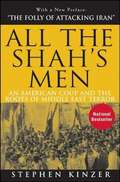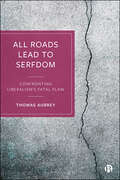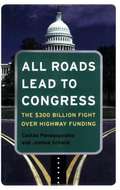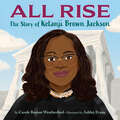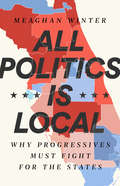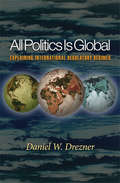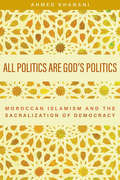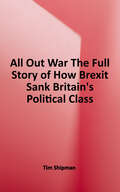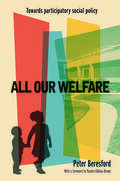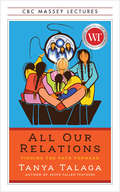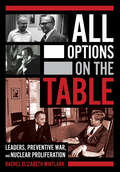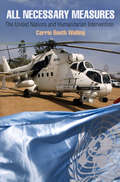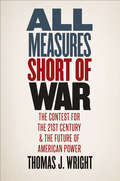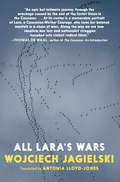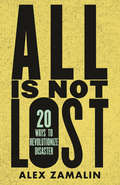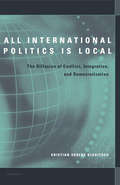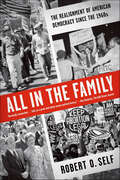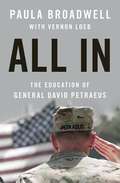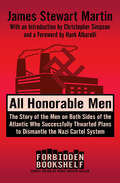- Table View
- List View
All The Shah's Men: An American Coup And The Roots Of Middle East Terror
by Stephen KinzerWith a thrilling narrative that sheds much light on recent events, this national bestseller brings to life the 1953 CIA coup in Iran that ousted the country's elected prime minister, ushered in a quarter-century of brutal rule under the Shah, and stimulated the rise of Islamic fundamentalism and anti-Americanism in the Middle East. Selected as one of the best books of the year by the Washington Post and The Economist, it now features a new preface by the author on the folly of attacking Iran.
All Roads Lead to the American City
by Peter SwirskiAll Roads Lead to the American City provides an original view of the urban culture in America seen through its irrevocable ties with the cities and roads. Examining the history, cinema, literature, cultural myths and social geography of the United States
All Roads Lead to Serfdom: Confronting Liberalism’s Fatal Flaw
by Thomas AubreyLiberal democracies are under increasing pressure. Growing discontent about inequality, lack of political participation and identity have rekindled populism and a shift away from liberal values. This book argues that liberalism’s reliance on a utilitarian policy framework has resulted in increased concentrations of power, restricting freedom and equality. It examines five key areas of public policy: monetary policy, private property and liability, the structure of the state, product markets and labour markets. Drawing on the German ordoliberal tradition and its founding principle of the dispersal of power, the book proposes an alternative public policy framework. In doing so, it offers a practical pathway to realign policy making with liberal ideas.
All Roads Lead to Congress: The $300 Billion Fight over Highway Funding
by Costas Panagopoulos Joshua SchankIn this case study of the US legislative process, Panagopoulos (political science, Fordham U.) and Schank (director of transportation research, Bipartisan Policy Center) follow the two-year path of the Safe, Affordable, Flexible, and Efficient Transportation Equity Act: A Legacy for Users (SAFETEA-LU) from its introduction in Congress to its arrival on the President's desk, a process they personally observed while working as fellows in the office of Senator Hillary Clinton. Annotation ©2008 Book News, Inc., Portland, OR (booknews.com)
All Rise: The Story of Ketanji Brown Jackson
by Carole Boston WeatherfordKetanji Brown Jackson, the first Black woman to serve on the Supreme Court, is an inspiration and role model to children of all ages. Award-winning author Carole Boston Weatherford tells her story of perseverance, dignity, and honor in this uplifting picture book biography filled with colorful and dynamic illustrations from Ashley Evans.Whatever she did, wherever she was, Ketanji Brown Jackson rose to the top.From the time their daughter was born, Ketanji Brown&’s parents taught her that if she worked hard and believed in herself, she could do anything. As a child, Ketanji focused on her studies and excelled, eventually graduating from Harvard Law School. Years later, in 2016, when she was a federal judge, a seat opened on the United States Supreme Court. In a letter to then-President Barack Obama, Leila Jackson made a case for her mother—Judge Ketanji Brown Jackson. Although the timing didn&’t work out then, it did in 2022, when President Joe Biden nominated her. At her confirmation, Ketanji Brown Jackson became the first Black female Supreme Court justice in the United States.Lyrical text by renowned author Carole Boston Weatherford and evocative illustrations by Ashley Evans combine to make this an inspirational and timely read.
All The Queen's Corgis: Corgis, dorgis and gundogs: The story of Elizabeth II and her most faithful companions
by Penny Junor'It is actually a serious book, but it had me laughing out loud several times on the Tube. All mothers should receive one for Christmas.' Marcus Berkmann, SpectatorEveryone who loves The Crown on Netflix will enjoy this celebration of Queen Elizabeth II and her beloved canine friends.The Queen has had corgis by her side ever since she was seven years old and persuaded her father to buy one for the family. She also has several dorgis (a cross resulting from an accidental liaison between one of the Queen's corgis and Princess Margaret's dachshund) and is a passionate breeder of gundogs.The dogs are the Queen's constant companions, travelling with her by air, road and rail, from one royal residence to another. She walks and feeds them herself, chooses names for them, and at the end of their days, buries them with personalised plaques to commemorate each individual. Penny Junor reveals the scraps and scrapes that the dogs have been involved in - the hierarchy amongst them, the corgis' feisty attitude to footmen and guests, gardeners and innocent passersby. This fascinating and affectionate look at the Queen and her most faithful companions is a book for dog lovers everywhere about what really makes our much-loved and longest reigning monarch truly light up.
All Politics Is Local: Why Progressives Must Fight for the States
by Meaghan WinterDemocrats have largely ceded control of state governments to the GOP, allowing them to rig our political system and undermine democracy itself.After the 2016 election, Republicans had their largest majority in the states since 1928, controlling legislative chambers in thirty-two states and governor offices in thirty-three. They also held both chambers of Congress and the presidency despite losing the popular vote. What happened?Meaghan Winter shows how the Democratic Party and left-leaning political establishment have spent the past several decades betting it all on the very risky and increasingly foolhardy strategy of abandoning the states to focus on federal races.For the American public, the fallout has been catastrophic. At the behest of their corporate patrons, Republican lawmakers have diminished employee protections and healthcare access and thwarted action on climate change. Voting rights are being dismantled, and even the mildest gun safety measures are being blocked.Taking us to three key battlegrounds--in Missouri, Florida, and Colorado--Winter reveals that robust state and local politics are the lifeblood of democracy and the only lasting building block of political power.
All Politics Is Global: Explaining International Regulatory Regimes
by Daniel W. DreznerHas globalization diluted the power of national governments to regulate their own economies? Are international governmental and nongovernmental organizations weakening the hold of nation-states on global regulatory agendas? Many observers think so. But in All Politics Is Global, Daniel Drezner argues that this view is wrong. Despite globalization, states--especially the great powers--still dominate international regulatory regimes, and the regulatory goals of states are driven by their domestic interests. As Drezner shows, state size still matters. The great powers--the United States and the European Union--remain the key players in writing global regulations, and their power is due to the size of their internal economic markets. If they agree, there will be effective global governance. If they don't agree, governance will be fragmented or ineffective. And, paradoxically, the most powerful sources of great-power preferences are the least globalized elements of their economies. Testing this revisionist model of global regulatory governance on an unusually wide variety of cases, including the Internet, finance, genetically modified organisms, and intellectual property rights, Drezner shows why there is such disparity in the strength of international regulations.
All Politics are God’s Politics: Moroccan Islamism and the Sacralization of Democracy
by Ahmed KhananiContemporary mass media descriptions of Muslims often suggest that Islam and Muslims are fundamentally undemocratic. Policy-makers in the West have weaponized these descriptions in attempts to legitimize anti-Muslim right-wing policy developments across the West and in the United States in particular, from surveillance in the aftermath of 9/11 to the anti-Islamic travel ban of 2017. But are Muslims undemocratic? Ahmed Khanani argues that this is not the case. In All Politics are God's Politics, Khanani shows that in fact, the opposite holds true: for socially conservative, politically active Muslims (Islamists), democracy or dimuqrāṭiyya reflects and extends their religious values. By drawing on conversations with over 100 Islamists in Morocco, this book enables readers to understand and appreciate the significance of dimuqrāṭiyya as a concept alongside new prospects for Islam and democracy in the Arab Middle East and North Africa (MENA). Khanani's in-depth analysis of the Moroccan case brings these Islamists and their attending political views to the forefront. Unfolding in a region marked by upheavals and academic inability to diagnose significant political developments, All Politics are God’s Politics contends that by attending to ordinary language everyday citizens use, one can in fact begin to accurately understand politics. Readers will discover that by connecting Islam to dimuqrāṭiyya, Islamists alter the meanings of both Islam and dimuqrāṭiyya, broaching new, democratic forms of Islam and rendering the everyday practices of dimuqrāṭiyya, like protesting electoral violations, protecting freedom of speech, and voting sacred.
All Out War: The Plot to Destroy Trump
by Edward KleinSince the moment Donald Trump launched his presidential campaign, powerful figures have been working to delegitimize the brash-talking businessman and drive him from office before he can drain the swamp and take away their power. Who are these determined and ruthless individuals who are waging all-out war against the president? Why have left-wing progressives and members of the conservative establishment joined forces to drive Trump from office? And what does this mean for the future of American democracy?Edward Klein, the former editor in chief of the New York Times Magazine, and the investigative reporter behind #1 New York Times bestsellers The Amateur and Blood Feud, exposes the villains behind the plot to destroy Trump."In America," writes Klein, "you are entitled to your own opinion, but you are not entitled to overthrow the democratically elected president of the United States and inflict irreparable damage on our country. That, however, is what Trump's enemies on the Left and Right are doing with lies, leaks, obstruction, and violence.For those who want to join the effort to prevent these villains from crippling our democracy, All Out War: The Plot to Destroy Trump is essential reading.
All Out War: The Full Story of How Brexit Sank Britain's Political Class
by Tim ShipmanShortlisted for the Orwell prize 2017. The best political book of the year' Andrew Marra superb work of storytelling and reporting. Sets new benchmark for the writing of contemporary political history' Andrew Sparrow, GuardianThe only book to tell the full story of how and why Britain voted to leave the EU.
All Our Welfare: Towards Participatory Social Policy
by Peter BeresfordThe UK welfare state is under sustained ideological and political attack. It has also been undermined by accusations of paternalism and past failures to engage with the very people it is intended to help. This unique book is the first to critique the past, present and future welfare state from a participatory perspective. Peter Beresford, champion of user involvement, draws on pioneering theories and practice of welfare service user movements to offer a blueprint for a new participatory social policy. He controversially challenges orthodox social policy and the limitations of both Fabian and Neo-liberal perspectives in engaging people to improve their own welfare, drawing on service users ‘ own ideas and experience, including fascinating vignettes from his own family’s experience, to demonstrate the value of ‘user knowledge’. Filling a much-needed gap in the literature, this accessible text will provide a great introduction for students and a road-map for practitioners of an alternative vision for a future participatory and sustainable social policy. It will also command much wider interest from everyone concerned with how we look after each other in future in society.
All Our Relations: Finding the Path Forward (The CBC Massey Lectures)
by Tanya TalagaTanya Talaga, the bestselling author of Seven Fallen Feathers, calls attention to an urgent global humanitarian crisis among Indigenous Peoples — youth suicide.“Talaga’s research is meticulous and her journalistic style is crisp and uncompromising. She brings each story to life, skillfully weaving the stories of the youths’ lives, deaths, and families together with sharp analysis… The book is heartbreaking and infuriating, both an important testament to the need for change and a call to action.” — Publishers Weekly *Starred Review*“Talaga has crafted an urgent and unshakable portrait of the horrors faced by Indigenous teens going to school in Thunder Bay, Ontario… Talaga’s incisive research and breathtaking storytelling could bring this community one step closer to the healing it deserves.” — Booklist *Starred Review*In this urgent and incisive work, bestselling and award-winning author Tanya Talaga explores the alarming rise of youth suicide in Indigenous communities in Canada and beyond. From Northern Ontario to Nunavut, Norway, Brazil, Australia, and the United States, the Indigenous experience in colonized nations is startlingly similar and deeply disturbing. It is an experience marked by the violent separation of Peoples from the land, the separation of families, and the separation of individuals from traditional ways of life — all of which has culminated in a spiritual separation that has had an enduring impact on generations of Indigenous children. As a result of this colonial legacy, too many communities today lack access to the basic determinants of health — income, employment, education, a safe environment, health services — leading to a mental health and youth suicide crisis on a global scale. But, Talaga reminds us, First Peoples also share a history of resistance, resilience, and civil rights activism. Based on her Atkinson Fellowship in Public Policy series, All Our Relations is a powerful call for action, justice, and a better, more equitable world for all Indigenous Peoples.
All Options on the Table: Leaders, Preventive War, and Nuclear Proliferation (Cornell Studies in Security Affairs)
by Rachel Elizabeth WhitlarkWhen is preventive war chosen to counter nuclear proliferation? In All Options on the Table, Rachel Elizabeth Whitlark looks beyond systemic and slow-moving factors such as the distribution of power. Instead, she highlights individual leaders' beliefs to explain when preventive military force is the preferred strategy. Executive perspective—not institutional structure—is paramount. Whitlark makes her argument through archivally based comparative case studies. She focuses on executive decision making regarding nuclear programs in China, North Korea, Iraq, Pakistan, and Syria. This book considers the actions of US presidents John F. Kennedy, Lyndon B. Johnson, George H. W. Bush, Bill Clinton, and George W. Bush, as well as Israeli prime ministers Menachem Begin, Yitzhak Rabin, and Ehud Olmert. All Options on the Table demonstrates that leaders have different beliefs about the consequences of nuclear proliferation in the international system and their state's ability to deter other states' nuclear activity. These divergent beliefs lead to variation in leaders' preferences regarding the use of preventive military force as a counter-proliferation strategy. The historical evidence amassed in All Options on the Table bears on strategic assessments of aspiring nuclear powers such as Iran and North Korea. Whitlark argues that only those leaders who believe that nuclear proliferation is destabilizing for the international system will consider preventive force to counter such challenges. In a complex nuclear world, this insight helps explain why the use of force as a counter-proliferation strategy has been an extremely rare historical event.
The ALL NEW Don't Think of an Elephant!
by George LakoffSince it became an international bestseller in 2004, Don't Think of an Elephant! has been the definitive handbook for progressives who want to articulate their goals and values to voters, understand how conservatives think and why people often vote against their best interests, and frame the political debate. Completely revised and updated to tackle today's issues, the 10th Anniversary Edition not only explains what framing is and how it works but also reveals why, after a brief stint of winning the framing wars in the 2008 elections, the Democrats have gone back to losing them, and what can be done about it. In this powerful new volume, George Lakoff delves into the issues that will dominate the midterm elections in 2014, the coming presidential elections, and beyond. He examines the current progressive and conservative frames on climate change, inequality, immigration, education, abortion, marriage, healthcare, national security, energy, and more. He explores why some issues have been difficult to frame, guides readers on how to frame complex issues without losing important context, and drives home the important differences between framing and spin. Do you think facts alone can win a debate? Do you think you know what makes a Tea Party follower tick? Do you think you understand how to communicate on key issues that can improve peoples' lives? Whether you answer yes or no, the insights in Don't Think of an Elephant! will not only surprise you, but also give you the tools you need to develop frames that work, and eradicate frames that backfire.
All Necessary Measures: The United Nations and Humanitarian Intervention (Pennsylvania Studies in Human Rights)
by Carrie Booth WallingWhat prompts the United Nations Security Council to engage forcefully in some crises at high risk for genocide and ethnic cleansing but not others? In All Necessary Measures, Carrie Booth Walling identifies several systematic patterns in the stories that council members tell about conflicts and the policy solutions that result from them. Drawing on qualitative comparative case studies spanning two decades, including situations where the council has intervened to stop mass killing (Somalia, Bosnia-Herzegovina, and Sierra Leone) as well as situations where it has not (Rwanda, Kosovo, and Sudan), Walling posits that the arguments council members make about the cause and character of conflict as well as the source of sovereign authority in target states have the potential to enable or constrain the use of military force in defense of human rights.At a moment when constructivist scholars in international relations are pushing beyond empirical claims for the value of norms and toward critical analysis of such norms, All Necessary Measures establishes discourse's real-world explanatory power. From her comparative chronology, Walling demonstrates that humanitarian intervention becomes possible when the majority of Security Council members come to a shared understanding of the conflict, perpetrators, and victims—and probable when the Council understands state sovereignty as complementary to human rights norms. By illuminating the relationship between national interests and the core values of Security Council members and how it influences decision-making, All Necessary Measures suggests when and where the Security Council is likely to intervene in the future.
All Men Want to Know: 'Intense, gorgeous, troubling, seductive' SARAH WATERS
by Nina Bouraoui'Intense, gorgeous, troubling, seductive - a novel that has to be surrendered to rather than read' Sarah Waters AN INTERNATIONAL BESTSELLERWINNER OF AN ENGLISH PEN TRANSLATES AWARD All Men Want to Know traces Nina Bouraoui's blissful childhood in Algeria, a wild, sun-soaked paradise, with hazy summer afternoons spent swimming, diving, and driving across the desert. Her mother is French, her father Algerian; when racial tensions begin to surface in their neighbourhood, her mother suffers an unspeakable act of violence that forces the family to flee the country. In Paris, eighteen-year-old Nina lives alone. It's the 1980s. Four nights a week she makes her way to The Kat, a legendary gay nightclub, where she watches women from the sidelines, afraid of her own desires, her sudden and intoxicating freedom. In her solitude, she starts to write - and finds herself writing about her mother.All Men Want to Know is a haunting, lyrical international bestseller about mothers and daughters, about shame and sexuality, about existing between two cultures and belonging to neither. A phenomenon in France, this is a defining portrait of womanhood from one of Europe's greatest living writers. 'Blown away by the power and lyricism of All Men Want to Know. What a book. Read it' Niven Govinden, author of THIS BRUTAL HOUSE 'Magnificent... a captivating autobiographical novel' Elle 'A tour de force' Le Figaro'Haunting, spell-binding, luminous' Lire
All Measures Short of War: The Contest for the Twenty-First Century and the Future of American Power
by Thomas WrightA groundbreaking look at the future of great power competition in an age of globalization and what the United States can do in response The two decades after the Cold War saw unprecedented cooperation between the major powers as the world converged on a model of liberal international order. Now, great power competition is back and the liberal order is in jeopardy. Russia and China are increasingly revisionist in their regions. The Middle East appears to be unraveling. And many Americans question why the United States ought to lead. What will great power competition look like in the decades ahead? Will the liberal world order survive? What impact will geopolitics have on globalization? And, what strategy should the United States pursue to succeed in an increasingly competitive world? In this book Thomas Wright explains how major powers will compete fiercely even as they try to avoid war with each other. Wright outlines a new American strategy—Responsible Competition—to navigate these challenges and strengthen the liberal order.
All Lara's Wars
by Wojciech JagielskiThe true story of one woman's struggle to save her sons from radicalization by Chechen partisans, as told by a seasoned war reporter.In All Lara's Wars, the great events of the last half-century--the realignment of Eastern Europe after the fall of the Soviet Union, and the rise in the Middle East of ISIS and its quest for a new Caliphate--converge in this account of a Chechen-Georgian family whose two sons become radicalized, and how their mother--Lara--travels to Syria by bus and at great risk, not to join them but to bring them home. By then, the older son is a high level commander and the younger son a respected soldier in ISIS's army. The story is told with a sense of wonder at the contemporary world and all the ways it resembles a primitive and violent land where all struggles are to the death, and there is an epic battle going on between forces of good and evil that cannot be understood other than as mythic and larger than life. Lara is a Kist--one of a tiny ethnicity that crossed the Caucasus mountains a century ago to settle in the remote Pankisi Gorge in northern Georgia, a peaceful and isolated paradise. She married a Chechen, moved to Grozny, and became the mother of two sons. When war came to Chechnya, she took her children home to the safe Georgian valley, and later sent them to Western Europe to live with their father--to protect them from the influence of the radical Islamic freedom fighters who had come to the Pankisi Gorge as refugees from the Chechnyan wars. As in all of Wojciech Jagielski's books, he tells here the story of any modern war, how the individual lives of civilians and combatants are obliterated in the sweep of the larger narrative--and how the humanity of these individual lives is revealed, and the price paid in human endurance and persistence and loss. Jagielski observes, listening to Lara and letting her story emerge through the filter of his literary skill. This unusual reportage tells us the facts of the Chechnyan wars and the reality of the Syrian war from the viewpoint of ISIS recruits, but it is also the true account of one ordinary family that became part of the larger tragedy that has claimed so many victims in recent years.
All Is Not Lost: 20 Ways to Revolutionize Disaster
by Alex ZamalinAn uplifting look at how organizers in the past have successfully leveraged crises into emancipatory politics, and a plea for continued progressive movement building in our tumultuous social climateFrom the climate apocalypse and COVID-19 to double digit unemployment to Donald Trump and the rise of far-right white nationalists—disasters are everywhere we look.While these disasters often leave us feeling hopeless and withdrawn, scholar Alex Zamalin argues that pessimism cannot be the only response. Silence and inaction only perpetuate mass suffering and inequality. Instead, All Is Not Lost suggests that following every crisis emerges new political opportunity for changing our politics and everyday lives.Blending intellectual history, biography, and political critique, Zamalin offers 20 specific lessons for our present moment, turning to moments in history to demonstrate how various figures in the past have successfully leveraged struggles into sources of political action and freedom. The lessons—on how to resist, how to speak, organize, treat others, think politically, memorialize, dream, write, occupy, build, and act—all build toward one truth: though disaster is something we cannot control from arriving, we can control how we confront it and what we build in its place. Using examples from the 17th century to the present, All Is Not Lost reminds readers to not back down in the face of crisis and instead offers radical lessons of continued resistance and movement building to create a successful progressive coalition.
All International Politics Is Local: The Diffusion Of Conflict, Integration, and Democratization
by Jeffrey D. Mason J. Ellen GainorThe world can be broken up into clusters: mature democracies, transforming democracies and autocracies.
All in the Family: The Realignment of American Democracy Since the 1960s
by Robert O. SelfIn the 1960s, Lyndon Johnson's Great Society and War on Poverty promised an array of federal programs to assist working-class families. In the 1980s, Ronald Reagan declared the GOP the party of "family values" and promised to keep government out of Americans' lives. Again and again, historians have sought to explain the nation's profound political realignment from the 1960s to the 2000s, five decades that witnessed the fracturing of liberalism and the rise of the conservative right. The award-winning historian Robert O. Self is the first to argue that the separate threads of that realignment—from civil rights to women's rights, from the antiwar movement to Nixon's "silent majority," from the abortion wars to gay marriage, from the welfare state to neoliberal economic policies—all ran through the politicized American family.Based on an astonishing range of sources, All in the Family rethinks an entire era. Self opens his narrative with the Great Society and its assumption of a white, patriotic, heterosexual man at the head of each family. Soon enough, civil rights activists, feminists, and gay rights activists, animated by broader visions of citizenship, began to fight for equal rights, protections, and opportunities. Led by Pauli Murray, Gloria Steinem, Harvey Milk, and Shirley Chisholm, among many others, they achieved lasting successes, including Roe v. Wade, antidiscrimination protections in the workplace, and a more inclusive idea of the American family.Yet the establishment of new rights and the visibility of alternative families provoked, beginning in the 1970s, a furious conservative backlash. Politicians and activists on the right, most notably George Wallace, Phyllis Schlafly, Anita Bryant, and Jerry Falwell, built a political movement based on the perceived moral threat to the traditional family. Self writes that "family values" conservatives in fact "paved the way" for fiscal conservatives, who shared a belief in liberalism's invasiveness but lacked a populist message. Reagan's presidency united the two constituencies, which remain, even in these tumultuous times, the base of the Republican Party. All in the Family, an erudite, passionate, and persuasive explanation of our current political situation and how we arrived in it, will allow us to think anew about the last fifty years of American politics.
All In: The Education of General David Petraeus
by Paula BroadwellGeneral David Petraeus is the most transformative leader the American military has seen since the generation of Marshall. In the New York Times bestseller All In, military expert Paula Broadwell examines Petraeus's career, his intellectual development as a military officer, and his impact on the U. S. military. Afforded extensive access by General Petraeus, his mentors, his subordinates, and his longtime friends, Broadwell reported on the front lines of fighting and at the strategic command in Afghanistan to chronicle the experiences of this American general as they were brought to bear in the terrible crucible of war. All In draws on hundreds of hours of exclusive interviews with Petraeus and his top officers and soldiers to tell the inside story of this commander's development and leadership in war. When Petraeus assumed command in Afghanistan in July 2010, the conflict looked as bleak as at any moment in America's nine years on the ground there. Petraeus's defining idea—counterinsurgency—was immediate put to its most difficult test: the hard lessons learned during the surge in Iraq were to be applied in a radically different theater. All In examines the impact in Afghanistan of new counterinsurgency as well as counterterrorism strategies through the commands of several Petraeus protégés. Broadwell examines his evolution as a solider from his education at West Point in the wake of Vietnam to his earlier service in Central America, Haiti, Kuwait, Bosnia, and Iraq. All In also documents the general's role in the war in Washington, going behind the scenes of negotiations during policy reviews of the war in Afghanistan in Congress, the Pentagon, and the White House. Broadwell ultimately appraises Petraeus's impact on the entire U. S. military: Thanks to this man's influence, the military is better prepared to fight using a comprehensive blend of civil-military activities. As America surveys a decade of untraditional warfare, this much is clear: The career of General David Petraeus profoundly shaped our military and left an indelible mark on its rising leaders. .
All I Ever Wanted to Know about Donald Trump I Learned From His Tweets: A Psychological Exploration of the President via Twitter
by John Gartner Rachel MontgomeryWe had to figure that by electing a decidedly non-career-politician, that things would be… different. But is this any way to run a country? Many opinions have been shared about Donald Trump, but we can learn so much more about the man via what he himself says – in 140 characters or less. Trump has tweeted nearly 35,000 times since launching @realDonaldTrump in March 2009, commenting on everything from immigration to policy climate change to even pop culture. As President, Trump tweets without ceasing, sometimes a dozen times a day, seemingly during important events and meetings. Apparently he believes that twitter is an effective tool for him to drive his agenda. But it’s one thing to be a brash, bold, and outspoken, maverick businessman, it’s quite another when the leader of the most powerful country in the world is talking politics as stream of consciousness.
All Honorable Men: The Story of the Men on Both Sides of the Atlantic Who Successfully Thwarted Plans to Dismantle the Nazi Cartel System (Forbidden Bookshelf #21)
by Mark Crispin Miller Christopher Simpson Hank Albarelli Jr. James Stewart MartinA scathing attack on Wall Street's illegal ties to Nazi Germany before WWII--and the postwar whitewashing of Nazi business leaders by the US government Prior to World War II, German industry was controlled by an elite group who had used their money and influence to help bring the Nazi Party to power. After the Allies had successfully occupied Germany and removed the Third Reich, the process of reconstructing the devastated nation's economy began under supervision of the US government. James Stewart Martin, who had assisted the Allied forces in targeting key areas of German industry for aerial bombardment, returned to Germany as the director of the Division for Investigation of Cartels and External Assets in American Military Government, a position he held until 1947. Martin was to break up the industrial machine these cartels controlled and investigate their ties to Wall Street. What he discovered was shocking. Many American corporations had done business with German corporations who helped fund the Nazi Party, despite knowing what their money was supporting. Effectively, Wall Street's greed had led them to aid Hitler and hinder the Allied effort. Martin's efforts at decartelization were unsuccessful though, largely due to hindrance from his superior officer, an investment banker in peacetime. In conclusion, he said, "We had not been stopped in Germany by German business. We had been stopped in Germany by American business." This exposé on economic warfare, Wall Street, and America's military industrial complex includes a new introduction by Christopher Simpson, author of Blowback:America's Recruitment of Nazis and Its Destructive Impact on Our Domestic and Foreign Policy, and a new foreword from investigative journalist Hank Albarelli.
